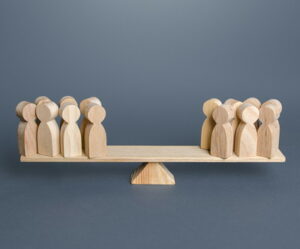 Imagine a jar that is filled with sweets. If you ask two people how many sweets are in the jar, you’re likely to get wildly different answers and the average of the two of them is therefore unlikely to be anywhere near the truth.
Imagine a jar that is filled with sweets. If you ask two people how many sweets are in the jar, you’re likely to get wildly different answers and the average of the two of them is therefore unlikely to be anywhere near the truth.
Ask 5,000 people, however, and the chances are that the average of all of the answers is somewhere very near the truth, thanks to the sheer number of people offering an opinion based on what they’re seeing. That is, in some ways, the perfect allegory for the world of betting exchanges and how they relate to public opinion.
Before betting exchanges existed, all people could place bets on where what bookmakers allowed them to. This limited the information that we could glean from the betting markets, given the fact that the things offered were limited.
Nowadays, though, punters are able to place bets on whatever they want to, presenting us with a wider depth of information to work with when trying to figure out what the public thinks about any particular topic. Betting exchanges can act as a pulse on public opinion, as long as you know how to interpret the data.
Follow The Money

As soon as David Cameron confirmed that the UK would host a referendum on its membership of the European Union, the financial markets in both the United Kingdom and the EU went into a state of uncertainty and flux. When Boris Johnson and other senior Conservative and Unionist Party members joined the campaign to Leave, the pound suffered a two-percent drop in value against the dollar.
The movement in the markets wasn’t driven by facts and data, but rather by speculation and the ever-shifting world of public opinion. What people thought was the thing that everyone most wanted to know.
In the past, people would carry out opinion polls on major topics and base what they thought the public was thinking on those opinion polls. The problem was, they weren’t always accurate. It was soon realised that people were willing to lie with their lips, rendering such polls wildly inaccurate.
When the betting exchanges launched, people noticed that the money would often be being placed on a different thing to what the opinion polls suggest it should be being put in. People lie with their lips, but not with their wallets.
At the early point of the Brexit campaign, opinion polls on the street were 54% Remain, 46% Leave. The money, meanwhile, had seen about 71.5% of the bets placed on Remain winning. There was a solid feeling that Remain was the right decision, but at that point Dominic Cummings hadn’t yet begun to get involved with the British press in manipulating opinions based on lies and racist rhetoric.
By the end of the campaign, the majority of bettors were backing Leave, proving that the eventual result shouldn’t have come as as much of a surprise to everyone as it actually did.
Bookies Use The Exchange

If you needed proof of the fact that exchanges are a bellwether of opinion, you need look no further than the fact that bookmakers themselves use exchanges to help them set their own prices. It makes complete sense, of course. Bookies can use exchange sites to see what people are backing and laying, which in turns helps them assess how accurate their own prices are.
They can shift prices in order to better bring them in line with public opinion, setting their prices accordingly and ensuring that they don’t have too big an exposure in one area or another.
Exchanges don’t need to build an Edge into the odds that they offer in the same way that bookmakers do. Instead, they simply take a percentage of winning bets, meaning that the odds that you get from an exchange is much more likely to be the ‘true’ odds on something that the ones that you’d get from a bookie.
Indeed, the Betfair Starting Price has now become something of an industry standard when it comes to figuring out what the real odds of something are, as opposed to the Starting Price offered by a selection of on-course bookmakers.
Everyone Lies Out Loud
 Ultimately, everyone lies out loud. A husband might tell their wife that no, their bum doesn’t look big in that dress, all whilst placing a bet on the dress splitting before the end of the night. What people do, say and think in private is often different to what they do, say and think in public.
Ultimately, everyone lies out loud. A husband might tell their wife that no, their bum doesn’t look big in that dress, all whilst placing a bet on the dress splitting before the end of the night. What people do, say and think in private is often different to what they do, say and think in public.
This was established in 1992, when pollsters said that Labour and the Tories were neck-and-neck going into the General Election. In actual fact, the Tories won by a veritable landslide, leading people to surmise that voters didn’t want to admit that they were going to vote for a right-wing party of self-interest.
What they wouldn’t say out loud, people will happily indicate via their betting habits. As with casting a vote in the privacy of a voting booth, placing a bet is a private activity that most people do unseen. This is why betting exchanges can help us to identify what people are really thinking and feeling about any given topic.
Whether it be Brexit, a General Election or voting for the winner of the BBC’s Sports Personality of the Year award, following what is happening on the betting exchanges will give us a clearer picture of what’s coming than opinion polls.
Of course, this doesn’t help us a huge amount. Oftentimes, we only find out where the money went after the fact. Now that you know the exchanges can help you learn the truth, though, you can keep your eyes out for information about where the money is going on the exchange for all of the big issues.
Just as the money placed on Brexit went one way in the build-up to it and another as it got closer, so too you’ll need to know how to interpret the information before you get carried away and place bets based on what you’ve learned.
